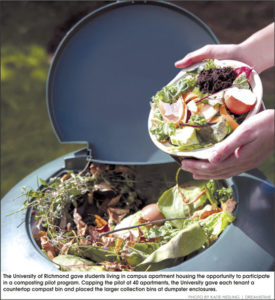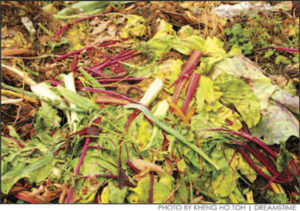by MAURA KELLER
While residential composting programs are being incorporated in many towns and cities across the U.S., more and more companies, schools and other large institutions are evaluating food waste composting throughout their facilities – with some jumping on board, while others are still evaluating the benefits.
Take the University of Richmond, for example. The University of Richmond had a composting program at its dining locations for years, but it was behind the scenes. COVID-19 accelerated the move to post-consumer compost collection because of the increase in single-use and disposable food service items.
“We jumped right in and went from no post-consumer compost collection in October 2020 to post-consumer compost collection at the outdoor seating area of our dining hall in November 2020, to post-consumer composting at all of our dining locations in February 2021,” said David Donaldson, Rethink Waste manager, University Facilities, University of Richmond.
In October 2021, Rethink Waste at the University moved from being a committee focused on waste diversion, with a heavy focus on composting, to an established entity within University Facilities and Custodial and Environmental Services, responsible for all aspects of waste management on campus. This change has allowed the school to merge the operational side of waste management to the educational and programmatic side of waste management on campus. And the University’s composting program also comes with a good deal of peer engagement. They have a student staff of 19 who are regularly out on campus at dining locations keeping up with unit managers.
“In the spring of 2022, our dining hall instituted a process in their dish room that resulted in them having the ability to capture all food scraps, napkins, compostable plates, etc. as compost. Anything else, waste brought in, ice cream wrappers, etc. is minimal and is pulled out and placed in a landfill collection bin,” Donaldson said.
In September 2022, the University kicked off a pilot residential composting program. They gave the opportunity to participate to students living in on campus apartment housing. Capping the pilot at 40 apartments, the University gave each of them a countertop compost bin and placed the larger collection bins at dumpster enclosures.
“The participating students were responsible for getting their organic waste from their apartments to the collection bins outside of the buildings,” Donaldson said. “This program has been so successful that we are planning to ask to either continue the program into the next semester or to double the number of participating residents.”
Organic waste isn’t meant to break down in an anaerobic environment and will emit much more methane and other GHGs while decomposing in a landfill. For the University of Richmond, composting has a huge educational benefit.
“Not only are we exposing our students to the fact that waste doesn’t have to go to the landfill but we’re also showing them potential future employment opportunities, demonstrating a healthier way of living for the planet and for themselves, and we’re giving them skills and information that they can take with them when they travel the world or just go back home in the summer,” Donaldson said. “Further, the University has a goal of diverting 75 percent of waste generated on campus from the landfill by 2025. Composting will have to be a large portion of our diversion effort for us to hit our ambitious mark.”
An Uphill Battle
According to Stacy Savage, founder & chief executive officer of Zero Waste Strategies LLC, food waste makes up about 30 to 40 percent of the entire materials stream in the U.S. Many municipal governments are offering curbside composting services to residents, but it’s the enormous volume of food waste from businesses that contributes most to that total percentage.
From Savage’s experience, many food-permitted businesses have not considered diverting food waste from landfills as part of their materials management system. They see composting as an additional expense, but don’t factor in the cost savings from the reduction of materials to the landfill dumpster. This efficiency upgrade can result in a contract renegotiation with the trash hauler for smaller dumpsters and less frequent weekly collections, which can offset the costs of new compost collection services and employee education needs.
Savage pointed to theme parks and sports stadiums getting a lot of press regarding large events being produced with materials diversion as a central focus.
“Business composting programs are more effective at sites that have a state-issued food permit and back-of-house (BOH) food prepping stations, such as employee cafeterias, campus catering services, hospitals, and entertainment venues, among others,” Savage said. “The BOH employees who are licensed to properly handle  food are also easily trainable to properly handle food waste if a composting program is accessible to them.”
food are also easily trainable to properly handle food waste if a composting program is accessible to them.”
Where Savage typically sees businesses getting into trouble is when they offer front-of-house (FOH) food waste composting systems to office employees, especially if they’re not properly trained on how to use the food waste bin correctly or they bring in foods from outside restaurants that provide packaging and utensils that are not compostable.
“Cross-contamination can be extremely expensive. As an example, one of my business clients had a BOH and FOH composting program. The BOH food waste stream was very clean with only fruit and vegetable peels, meat and dairy scraps, and liquids,” Savage said. “The FOH food waste stream was littered with plastic wraps from sandwiches, single-use plastics, like cutlery, cups, and straws, and to-go condiment packages and sauce cups with lids, etc. The food waste hauler charged my client a minimum of $2,700 per month ($32,400/year) for these issues as their workers had to sort through and pick out the contaminants so its compost soil could be processed as a clean product to sell to its clients.”
To offset these types of issues, Savage recommends materials management companies that handle recycling and composting operations offer to provide training for their clients’ employees. This can be done via scheduled in-person meetings, educational resources and handouts, or a video training portal.
They can also ensure their clients’ interior and exterior bins are properly color-coded and positioned for convenient accessibility, have consistent/better signage with a dual language format (usually English/Spanish), and graphics showing what is and is not allowed in each bin.
“They should be ready to renegotiate contracts with established clients who want to reduce waste to landfill by incorporating new systems for food waste diversion through composting. Landfill trash hauling contracts will need ‘right-sizing’ when these new services are engaged,” Savage said. “And they should become sales affiliates of other companies that offer compostable bin liners and food wares, such as biodegradable food and beverage containers and cutlery. This will assure their business clients that these wares purchased from them are compatible with their own composting process and can lessen contamination fees.”
Looking Ahead
Recycling organics doesn’t need to be hard, but it does come with its challenges. As Vinnie Bevivino, senior director of organics at Bioenergy Devco explained, it’s often easier to just throw everything away, as it takes more time and effort to separate organics from the remainder of the waste stream. However, to address this challenge Bioenergy Devco has adopted depackaging technology to separate plastics and other packaging from food waste at our composting sites.
“We have a tolerance for a certain amount of packaging, and mechanically remove that prior to the food waste being recycled. Large entities bringing waste to us for composting don’t have to be as meticulous with separation,” Bevivino said. “The other challenge is simply finding an organic recycling facility that has capacity. We’re seeing more and more composting and anaerobic digestion facilities being planned and built.”
Bevivino further pointed out that the industry is moving away from the “build it and they will come” mentality that’s driven most of the organics recycling facility development to date and moving to facilities being developed based on long-term partnerships between organic waste generators and recyclers.
“This gives the recycler steady and predictable waste processing to finance and operate their facilities, and waste generators then have dedicated recycling capacity and long term waste disposal prices,” Bevivino said.
Challenges aside, Savage said the good news is that waste reduction is the lowest hanging fruit of any operational efficiency for the strongest opportunity for cost savings. Workers and consumers now expect that businesses offer higher standards of sustainability. Internal recycling and composting are two key solutions that can be instituted.
For example, Zero Waste Strategies serviced a Catholic convent in Houston through a waste audit. The residents were angered that the administrative offices of the diocese chose to serve all convent meals with single-use plastics and foam trays. They stated that this activity was shortsighted and prevented them from fulfilling their sacred vows to protect the planet.
“The Sisters worked with us to determine the percentages of food waste, recyclable items, and single-use components that could have been diverted, had the appropriate programs been in place, or simply avoided altogether,” Savage said. “The findings were so shocking that they were presented to the Archbishop for distribution to educate other dioceses across Texas.”
Donaldson thinks that as time goes on post-consumer compost collection will just become part of how we do things. “The more ubiquitous compostable items become, and the closer we get to creating an environment where there is no question about which bin to toss your cup in, the better and easier our program, or any post-consumer composting program, will be,” he said. “The easier we make compost collection and disposal, the more successful these programs will be.”
Published in the January 2023 Edition







